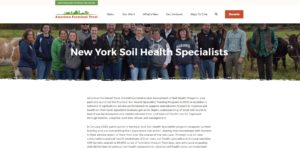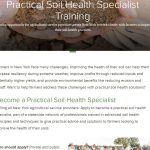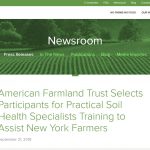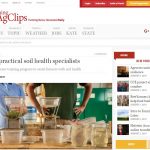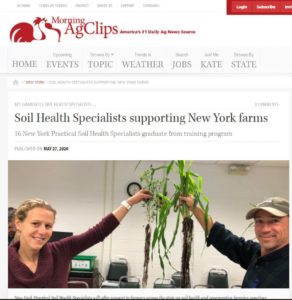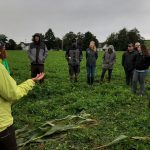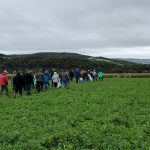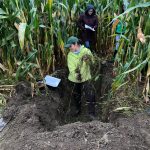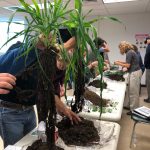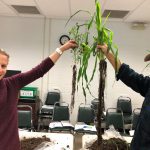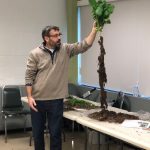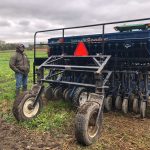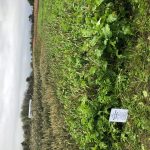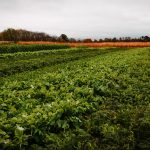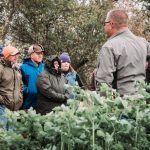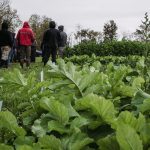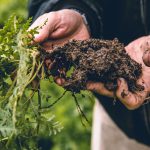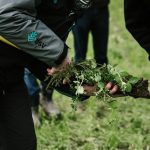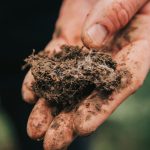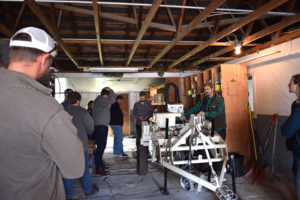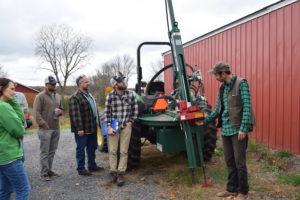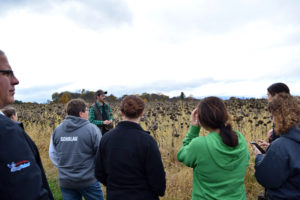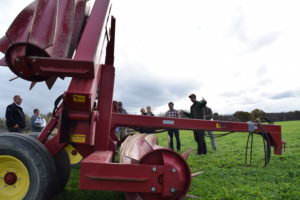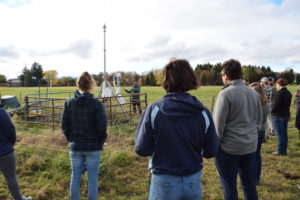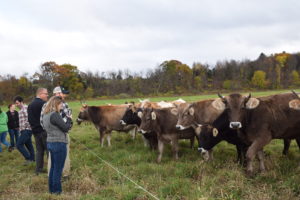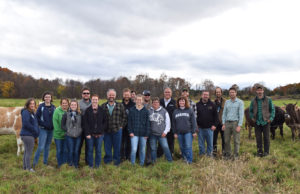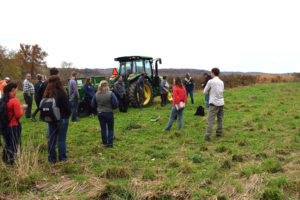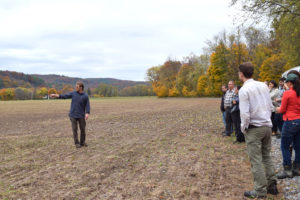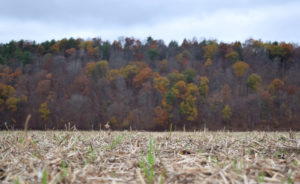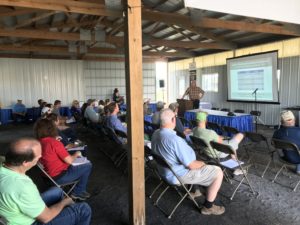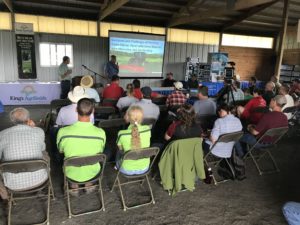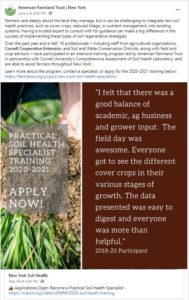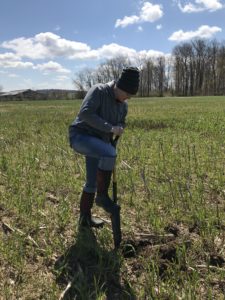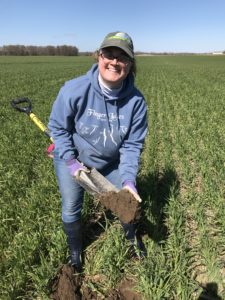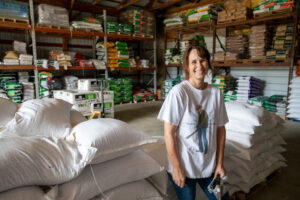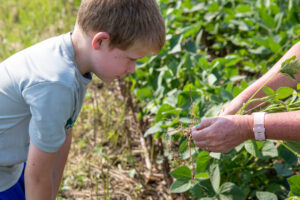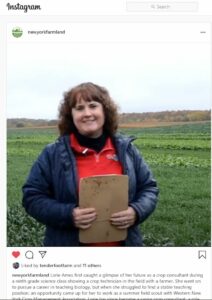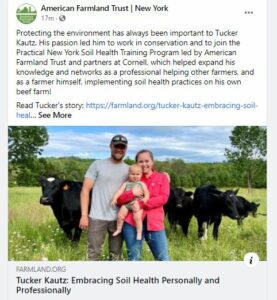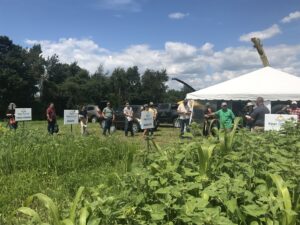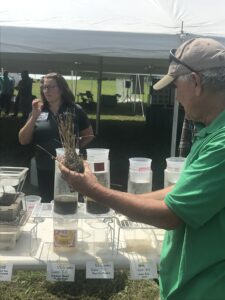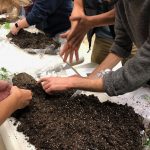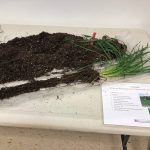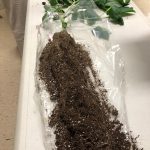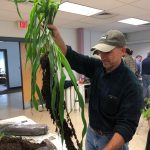Final report for ENE18-153
Project Information
Despite the known benefits of healthy, fully-functioning soils, NY farmers struggle with integrating diverse crop rotations, cover crops, reduced tillage or no-till, nutrient management, organic amendments, and other soil health practices into their management systems. This is particularly true for dairy farmers, with limited time availability for crop management, and vegetable farmers looking to maximize production.
To motivate farmers to implement practices, they need an advanced understanding of the benefits of soil health, soil health management, soil biology and the economic implications for adoption. A 2016-17 Report of the National Cover Crop Survey highlighted enthusiasm for cover crops remains high and the acreage continues to increase. “Non-users of cover crops report high interest and expressed concerns that could largely be addressed with more information on cover crop species and practices.” “It is likely that many non-users could be convinced to try cover cropping, particularly as commodity prices recover and more education and training is provided.” (CTIC, 2017 Report of the 2016-17 National Cover Crop Survey). A 2014 cover crop survey of NY farmers (Ketterings et al., 2015) supports this finding by concluding that more technical experts are needed to assist farmers with understanding the benefits of healthy soil, soil health assessments and implementation of practices addressing soil constraints, and perceived barriers particularly those related to economics.
The “New York Soil Health Specialist Training Program” provided a structured set of courses for 20 agricultural service professionals across New York State. The goal was to establish a network of Practical Soil Health professionals to support and educate farmers to improve soil health on their land. The program offed a series of five two-day workshops with associated field days focused on developing technical knowledge in soil health principles and practical aspects of soil health management. Trainees learned from university researchers, extension educators, conservationists, and agronomists on topics around soil health principles, assessment, measurement, management systems, farm/farmer specific adaptation of practices, and outreach and delivery techniques. Trainees also learned from farmers at field days across the state, as well as gained knowledge on applying soil health practices in diverse soil conditions and farming operations. All five of the workshops have resources that are available online, along with course materials. In addition, three soil health related webinars were recorded and made available online. In the final year of the program, Soil Health Specialists were charged with organizing and hosting their own soil health related workshop and provide technical assistance on soil health to their farmer clientele.
At completion of the program, 15 Ag Service Providers held 17 events, directly reaching 362 farmers (managing 88,973 acres) and 1,356 other stakeholders who likely reached additional farmers across the state. Furthermore, the beneficiaries conducted technical assistance with 196 farmers influencing 68,530 acres.
With the consultation of our beneficiaries, a total of 101 farmers either conducted a soil health assessment, developed a soil health plan, and/or implemented a soil health practice such as cover cropping, reducing tillage, crop rotation, addition of organic amendments or nutrient management on a total of 19,709 acres. There were 56 Soil Health Assessments conducted, 47 soil health plans developed and 89 practices implemented. An exit survey of beneficiaries found that 100% of participants interviewed mentioned improved confidence when discussing soil health, 86% only mentioned positive impressions related to field experiences, 65% cited professional connections as an important method at the workshops for learning the topics, gaining confidence in talking about soil conservation at work, and improving soil conservation adoption, and 17% expressly mentioned that they were planning to adopt more soil health practices.
Performance Target for Service Providers
Twenty (20) agricultural service providers trained in advanced soil health principles and practical methods for using crop rotations, cover crops, reduced tillage, nutrient management and other practices on diverse farms across New York will teach 400 farmers operating 80,000 acres about soil health techniques and how to successfully integrate them into their production systems.
Performance Target for Farmers
Fifty (50) farmers informed by our beneficiaries will conduct a soil health assessment, develop a soil health plan, or implement a soil health practice such as cover cropping, reducing tillage, crop rotation, and/or nutrient management trial or demonstration.
On-farm and university research highlight that healthy, fully-functioning soils offer substantial benefits to farmers as they are resilient to weather extremes, maximize water and nutrient storage, and increase profitability through decreased input costs and increased yields. Healthy, fully-functioning soils also help protect water quality; reduce runoff contributing to soil erosion, water degradation, and contributing to flood events; and sequester carbon. However, despite the benefits, NY farmers struggle with integrating crop rotations, cover crops, reduced tillage or no-till, nutrient management including the use of compost, and other soil health practices into their management systems. This is particularly true for dairy farmers, with limited time availability for crop management, and vegetable farmers looking to maximize production.
To motivate farmers to implement practices, they need an advanced understanding of the benefits of soil health, soil health management, soil biology and the economic implications for adoption. A 2016-17 Report of the National Cover Crop Survey highlighted enthusiasm for cover crops remains high and the acreage continues to increase. “Non-users of cover crops report high interest and expressed concerns that could largely be addressed with more information on cover crop species and practices.” “It is likely that many non-users could be convinced to try cover cropping, particularly as commodity prices recover and more education and training is provided.” (CTIC, 2017 Report of the 2016-17 National Cover Crop Survey). A 2014 cover crop survey of NY farmers (Ketterings et al., 2015) supports this finding by concluding that more technical experts are needed to assist farmers with understanding the benefits of healthy soil, soil health assessments and implementation of practices addressing soil constraints, and perceived barriers particularly those related to economics.
This program offered a 3-year training curriculum for 20 agricultural service professionals across New York State. The goal was to establish a network of Practical Soil Health professionals to support and educate farmers to improve soil health on their land. The training was a series of five two-day workshops with associated field days focused on developing technical knowledge in soil health principles and practical aspects of soil health management. Trainees learned from University researchers, Extension Educators, conservationists, and agronomists at a series of in-depth workshops on soil health principles, assessment, measurement, management systems, farm/farmer specific adaptation of practices, and outreach and delivery techniques. Trainees also learned from farmers at field days across the state, as well as gained knowledge on applying soil health practices in diverse soil conditions and farming operations.
Cooperators
- (Educator)
- (Educator)
- (Researcher)
- (Researcher)
- (Educator)
- (Educator)
- (Researcher)
- (Educator)
- (Educator)
- (Educator)
- (Educator)
- (Researcher)
- (Educator)
- (Researcher)
- (Educator)
- (Educator)
- (Educator)
- (Educator)
- (Educator)
- (Researcher)
- (Researcher)
- (Researcher)
- (Educator)
- (Researcher)
- (Researcher)
- (Educator)
- (Researcher)
- (Researcher)
- (Researcher)
Educational Approach
Twenty (20) agricultural service providers were trained in advanced soil health principles and practical methods for using crop rotations, cover crops, reduced tillage, nutrient management and other practices on diverse farms across New York State.
A separate curriculum was developed for each workshop, which was planned with the guidance of a steering committee that included participants from Universities, Conservation Agencies, Agribusiness and other Ag Service Providers. The workshops were delivered through a two-day training that included classroom and in-field visits to working farms. The program teaching methodology had three distinct approaches. First, the program was practical and hands on; facilitators used field experiences, demonstrations, and farm visits to teach participants. Second, the program was collaborative and peer-oriented, exemplified in the use of group discussions and exercises. Finally, the program was sequential; the material on soil health continually built on itself over a series of meetings.
Once the trainings were completed, the trainees were charged with conducting their own outreach and technical assistant activities to inform farmers about soil health techniques and how to successfully integrate them into their production systems. From the trainees we expected a total of 400 farmers operating 80,000 acres to be reached through field days and fifty (50) farmers to take the next steps of conducting a soil health assessment, developing a soil health plan, or implementing a soil health practice such as cover cropping, reducing tillage, crop rotation, and/or nutrient management.
Milestones
RESOURCE DEVELOPMENT
1. Advisory committee of key members of New York’s soil health and agricultural service communities will compile an advanced soil health curriculum specific to New York’s agricultural industry, soils, and topography for agricultural service providers. It is our intention for this curriculum to be available beyond the life of this project for use by others seeking to provide soil health training either “right out of the box” or as a template to be adjusted as needed. April 2018 – December 2019
5
11
February 28, 2020
Completed
January 21, 2020
An advisory committee was formed in April of 2018 and met six times between April 16th and October 2nd, 2018 to discuss selection criteria and to plan the curriculum specific to New York’s agricultural for Workshops One and Two. Committee members also provided input through email and phone conversations throughout the project. Updates on the progress of the curriculum was sent to the advisory committee periodically. The committee consisted of approximately 15 people from Cornell University, Cooperative Extension, Soil and Water Conservation Districts, the NYS Soil and Water Conservation Committee, NRCS, and Agribuisness including four farmers and two Ag Consultants. Workshops one through five have been completed, the final workshop concluded on January 21st, 2020. Materials from all of the workshops, including presentations, have been shared with class participants. A webpage with course materials and some videos is also publicly available.
(http://soilhealth.cals.cornell.edu/workshops/american-farmland-trust/)
Completion of curriculum development was delayed due to inclement weather in March of 2019. We also found that there were already many commitments to March meetings by project beneficiaries and therefore they were unavailable for our March meeting.
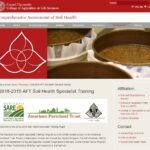
In addition, American Farmland Trust created a short informational webpage for the general public interested in learning more about the program. That page can be found here: https://farmland.org/project/new-york-soil-health-specialists/
RECRUITMENT and PRE-TRAINING ENGAGEMENT
2. 30 agricultural service providers from organizations such as New York Agri-Business Association, NE Region CCA, Cornell Cooperative Extension, NY Soil & Water Conservation Districts, AEM Planner List-serve, NOFA-NY and others respond to recruitment materials that clearly state performance target and outline our expectations for our beneficiaries. The service providers complete the application process which will include a pre-training skills assessment and a requirement to identify interested farmers they currently advise who they can further assist on soil health issues if selected for training program.
30
8
39
June 30, 2018
Completed
July 20, 2018
In June 2018 a recruitment announcement for program applications was sent out to agricultural service providers through the List-servs of organizations such as New York Agri-Business Association, NE Region CCA, Cornell Cooperative Extension, NY Soil & Water Conservation Districts, AEM Planners, NOFA-NY and others (see attached announcement – “02-Soil-Health-Specialist-Flyer-060618-final”). The flyer included a link to where individuals could apply to the professional opportunity.
Both the flyer and the website recruitment materials clearly stated performance targets and expectations for our beneficiaries.
Thirty-nine service providers from Agri-business, farmers, cooperative extension, soil and water conservation districts, and non-profits completed the application process which closed July 20, 2018. We exceeded our goal of attracting at least 30 applicants. There were 21 applications from the private sector and 19 from the public with an impressive geographic distribution among the applicants. The application included a pre-training skills assessment and questions to identify interested farmers they currently advise who they can further assist on soil health issues if selected for training program.
3. Twenty applicants will be accepted into the training program. Their acceptance notification will repeat our performance target and beneficiary requirements and expectations. Beneficiaries will develop their own training plans on a template provided, integrating the orientation workshop and at least 3 of the 4 following workshops and field days into their training plan. Contact information will be provided for assistance in developing training plans.
20
11
43
August 31, 2018
Completed
August 24, 2018
A beneficiary selection criteria document was created on April 16th listing eight key characteristics to look for in a successful applicant (See upload 04-Beneficiary-Selection-Criteria-Final). A sub-committee convened on August 13, 2018 to discuss selections of the final applicants. Private-sector applicants received higher priority in the selection process as that was the primary focus of the trainings, but there is also public sector representation. Seven of the 20 beneficiaries are also active farmers. Notices for acceptance into the program were sent out on August 24th, 2018. The acceptance notification included reminders of our performance target and beneficiary requirements and expectations. A congratulatory letter, instructions on how to pay the registration fee, a letter for them to sign affirming their commitment to the program, a tentative curriculum outline, a draft agenda of the first workshop, and a survey of training needs were included in the notification email.
- 05 AFT Soil Health Specialist Congratulations 082318
- 06-AFT-SHS-Payment-Instructions
- 07-AFT-SHS-Affirmation-Letter-082418
- 08-AFT-SHS-Survey-of-Training-Needs-082418
- 09-AFT-Soil-Health-Specialist-Denial-082418
Notices for those not accepted into the program were also sent out at that time.
A press release was posted to the AFT website on September 21, 2018 and was picked up by other outlets, including Morning Ag Clips (https://www.morningagclips.com/aft-trains-practical-soil-health-specialists/).
A press release was posted to the AFT website on September 21, 2018 and was picked up by other outlets, including Morning Ag Clips.
Learning Through Education Program 1 - SHST Graduate Announcement 042920
As previously mentioned, a survey of training needs was sent out with the initial acceptance announcement and a template was handed out with time to complete it at the second workshop. However, we have found that it is difficult to get the beneficiaries to respond with much interest in the training plans. A lesson learned from this project is that participants prefer to develop learning plans during time allocated at the workshop and not on their own, so time should be allocated in the agenda.
As further explained in the "Additional Outcomes" section below, a second round of training was held due to the extension of the SARE grant and because Cornell University received funding to do additional training. This second round included 23 Ag Service Providers. 3 of them are also farmers. 1 additional farmer participated making the total 24 additional trainees in 2020 and 2021.
LEARNING THROUGH EDUCATION PROGRAM
4. Twenty (20) enrolled participants will attend Orientation Workshop #1: Program Orientation and Basic Soil Health Assessment- Orientation to include: project Performance Target, Milestones, Verification, and beneficiary training plans and expectations. Basic Soil Health Assessment to include principles of soil health, soil biology, soil physics, soil health assessment and measurement, and how to use soil health tests to guide recommendations.
20
11
65
September 30, 2018
Completed
September 25, 2018
Workshop One was conducted September 24 and 25, 2018 in Cortland, NY. The curriculum was led by Cornell’s Soil Health Team and was based on training NRCS provides to their staff. This workshop started with an orientation to introduce beneficiaries to the requirements and expectations of the program which included the project Performance Targets, Milestones, Verification, and an introduction to the training plans.
See handouts:
- 12-SARE-AFT-Welcome-Letter-WS-1
- 13-SARE-AFT-List-of-Committments
- 14-SARE-AFT-Project-Milestones
- 15-SARE-AFT-Workshop-Outline-and-Schedule
This first day focused on the principles of soil health, and a detailed discussion of soil biology. We hosted an orientation social hour in the evening of Day One for beneficiaries to build relationships and strengthen networks as part of their professional development. Day Two focused on soil ecology, soil health indicators, assessment techniques and soil health management planning. The afternoon of Day Two was held on-farm and focused on identifying soil health indicators in the field, using soil pits as a teaching and demonstration tool, and learning about soil health systems on the host farm.
The workshop was held in conjunction with the New York State Conservation Districts Employees Association’s annual Conservation Skills Workshop. Our program was included in their schedule and registration was open to NYSCDEA registration system. An additional 22 people from NRCS and Soil and Water Conservation Districts attended the training.
A separate web page was created on the Cornell Comprehensive Assessment of Soil Health website and shared with project participants with general project information, agenda, speaker bios, participant bios, and presentations:
- 16-SARE-AFT-WS-1-Participant-Bios
- 17-SARE-AFT-WS-1-Agenda-Final
- 18-SARE-AFT-WS1-Speaker-Bios
- 19-SH-Specialist-Training-Orientation-Intro
http://soilhealth.cals.cornell.edu/workshops/american-farmland-trust/
Additional Cornell training series
As further explained in the "Additional Outcomes" section below, a second round of training was held due to the extension of the SARE grant and because Cornell University received funding to do additional training. This second round included 23 Ag Service Providers. 3 of them are also farmers. 1 additional farmer participated making the total 24 additional trainees in 2020 and 2021. The second round of workshops were modified from the original curriculum due to feedback from the original beneficiaries and COVID-19 restrictions. Therefore the original Workshop 1 was condensed and combined with Workshop 2 and held on October 22nd and 23rd, 2020. The reported numbers for Milestone#4 are reflective of including attendees of all workshops for the second round.
5. The 20 enrolled participants will attend one or more of the remaining workshops:
• Workshop #2 and Field Day, November 2018: Cropping Systems and Cover Crops- covering crop rotation and the benefits of cover crops; cover crop characteristics and seed mixtures; adapting cover crop management for differing purposes, soils, and types of farms; planting dates and methods; and termination. The field day will cover similar topics at a farm or USDA Big Flats Plant Material Center with farmer and farm advisor participants giving our students the chance to hear questions and experiences from farmers and observe the workshop presentations and demonstrations.
• Workshop #3 and Field Day, February 2019: Adaptive Nutrient Management for Soil Health- covering nutrient cycling, how soil biology impacts nutrient management, cover crop scavenging of nutrients, sampling and fertilizer recommendations. A field day for farmers and their advisors covering similar topics will give our students the chance to hear questions and experiences from farmers and observe the workshop presentations and demonstrations.
• Workshop #4 and Field Day, August 2019: Eliminating, Reducing, and Modifying Tillage for Soil Health- covering the benefits of reducing tillage; no-till, planting green, and alternative tillage methods will be discussed with considerations for differing soil types and management schemes. The field day with farmers will focus on tillage and planting equipment potentially in conjunction with Empire Farm Day’s soil health programing and demo plots.
• Workshop #5 and Field Day, November 2019: Covering customizing soil health systems to the farm and farmer, the economics of soil health, and communication skills. An “indoor” field day on honing communication skills, utilizing social media, and helping farmers build their "emotional bank account” will be held for farmers, their advisors and students.
20
88
November 30, 2019
Completed
January 21, 2020
Workshop 2:
Workshop Two was conducted October 23 and 24, 2018 in Ithaca, NY. As with the first workshop, the curriculum was led by Cornell’s Soil Health Team but focused on cover crops and adapting cover crop management to different soil types and farm operations. Day One presentations included cover crop characteristics, planting dates and addressing soil specific health constraints through using selected cover crop species or mixtures. One highlight of the training was the hands-on cover crop demonstration where 20 varieties of cover crops were planted in plastic tubes and grown in a greenhouse for five weeks prior to the workshop. The cover crops were brought to the workshop and pulled out of the tubes so that participants could see the bare root systems of each of the plants. The beneficiaries had the opportunity to pick up and examine all of them in one place. This was followed-up by a discussion of each plant, one-by-one, lead by Cornell’s Sustainable Cropping Systems Lab Assistant Professor Mathew Ryan:
Day Two focused on the economics of cover cropping in New York, based on a 2017 survey of farms across the state. We also addressed how nitrogen management can be affected by the use of cover crops. We ended the classroom experience with a panel of farmers who have been implementing cover crops long term. They shared their experiences and expertise. In the afternoon we headed outside to a field day where 35 plots were planted on three dates with different species and mixtures. The field day was open to the public and was coordinated and lead by one of the program’s beneficiaries. There was a tour of the plots lead by a team of experts from the German company, DSV, which provided a unique perspective to cover cropping. The field day also included the New York Soil Health Trailer and a Soil Pit. See attached agenda.
- 26-SARE-AFT-WS-2-Agenda-Final
- 27-SARE-AFT-WS-2-Speaker-Bios
- 28-SARE-AFT-WS-2-Producer-Bios
- 29-Field-Day-Cayuga-Ag-Cover-crops-Final
Course materials are available at http://soilhealth.cals.cornell.edu/workshops/american-farmland-trust/
A post-workshop survey was handed out at the workshop. See attachment for a summary of the responses: 30a WS2 Evaluation_Summaries 102418
One beneficiary took the time to send an email with the following praise:
“I was very happy with this session. I took a lot away regarding cover crop species and their specific traits. I feel that the data was presented in a way in which we all understood it. Seeing the different plants, with their root structures really helped me. I feel a lot more confident in advising growers on cover crops. I felt that the lower point / activity ratio was perfect. With the presenters I felt that there was a good balance of academic, ag business and grower input. The field day at king agra was awesome. Everyone got to see the different cover crops in their various stages of growth. The data presented was easy to digest and everyone was more than helpful.”
A list of resources was shared after the second workshop. See PDF: 31-SARE-AFT-References. One participant had this to share:
“Thank you to everyone for putting this together. What a gem! I began to go through the document without previewing it; thinking I would be able to review and provide feedback. The breadth of experience and knowledge of our instructors is evidenced in the scope of this collection! Needless to say, I cannot add anything at this time. I look forward to applying what is contained in it. Personally, I find it astounding. Coming from the background I have, and with what I am learning, I see many opportunities, many challenges, and am more aware of how our historical and current practices interact with the soil.”
Additional Cornell training series
As further explained in the "Additional Outcomes" section below, a second round of training was held due to the extension of the SARE grant and because Cornell University received funding to do additional training. This second round included 23 Ag Service Providers. 3 of them are also farmers. 1 additional farmer participated making the total 24 additional trainees in 2020 and 2021. The second round of workshops were modified from the original curriculum due to feedback from the original beneficiaries and COVID-19 restrictions. Therefore the original Workshop 1 was condensed and combined with Workshop 2 and held on October 22nd and 23rd, 2020. The reported numbers are reflective of including attendees of all workshops for the second round.
Workshop 3:
Workshop #3, was originally scheduled for March 6th and 7th, 2019 but was postponed due to poor weather and because there were several other established winter meetings already scheduled in late February and most of March. This made it difficult for our particular group to be able to attend our event which was new to their schedule. However, this workshop was rescheduled and held October 29 and 30, 2019 in two locations. Because it was necessary to reschedule around farm activities, this workshop became our 4th workshop in the series. However, it will be described here.
As always, the curriculum was led by Cornell’s Soil Health Team and focused on nutrient management and carbon cycling. Day One topics included an introduction to biochar and it’s benefits for soil health (video), a facilitated discussion on nutrient management in pasture systems, and a video-conference presentation on tools for precision nitrogen management (video). The group was also given introductions to the farms that were featured for this training by Matt Sheffer of Stone House Farms and Conrad Vispo of the Hudson Valley Farm Hub. See attached agenda: 01 SARE AFT WS 4 Agenda Final
In the afternoon of day one, we had an extensive tour of Stone House Farms in Hudson, New York. Working with the Rockefeller family, Stone House Farm has dramatically changed its production methods to embrace diverse soil health practices. They have established a new project, Hudson Carbon, that is focused on documenting the climate impacts of adopting soil health practices, including no-till, cover crops, and pastured livestock. They are collaborating with Marine Biological Laboratory to analyze carbon cycling from soils across 12 sites on their farms. In order to do this, they have been collecting data on their farm along with a conventional, neighboring farm for the past four seasons. We made several stops along the tour to examine their cropping systems and to see how they are collecting data. At the end of the farm tour, we had a reception at the Churchtown Dairy to foster peer-to-peer networking within the group of specialists. See attached photos:
The morning of day two focused on the agricultural management effects on nutrient loss to waterways and the atmosphere. We included a farmer-led discussion with Jay Goldmark, field crops production manager for the Hudson Valley Farm Hub.
In the afternoon of day two, we had an extensive tour of the Hudson Valley Farm Hub which is a non-profit center for resilient agriculture located on 1,500 acres of prime farmland in Hurley, NY. They provide professional farmer training, host and support agricultural research, demonstrate new farm technologies, and serve as an education resource for advances in food and farming. The Farm Hub works with local farmers and partner organizations to identify barriers to and opportunities for building a resilient food system. See attached photos:
A post-workshop survey was handed out at the workshop. See attachment for a summary of the responses. 11 WS4 Evaluation_Summaries Some highlights of responses include:
“What I liked best about this course was all the farms and the experiments shared. Very awesome to hear the innovative and advanced work going into soil health practices. These farmers seem more like scientists than laborers and tractor drivers.”
Another said: “This was by far my favorite workshop. Being able to interact with growers and see how they run their operations is always an interesting learning experience. It's fascinating going to operations different than the one many of us typically work with and getting to experience first-hand how they are run.”
Course materials are available at http://soilhealth.cals.cornell.edu/workshops/american-farmland-trust/
Additional Cornell training series
As further explained in the "Additional Outcomes" section below, a second round of training was held due to the extension of the SARE grant and because Cornell University received funding to do additional training. This second round included 23 Ag Service Providers. 3 of them are also farmers. 1 additional farmer participated making the total 24 additional trainees in 2020 and 2021. The second round of workshops were modified from the original curriculum due to feedback from the original beneficiaries and COVID-19 restrictions. Therefore the original Workshop 3 was condensed and combined with Workshops 4 and 5 and held on April 8 and 9, 2021. The reported numbers are reflective of including attendees of all workshops for the second round.
Workshop 4 and Field Day:
Due to the postponement of the workshop originally scheduled for March 2019, Workshop 4 actually became workshop 3, and was held August 6th and 7th, 2019 in conjunction with the New York State Empire Farm Days soil health programming and demo plots, as originally planned. The curriculum was led by Cornell’s Soil Health Team. See attached agenda and photos:
12 SARE AFT WS 3 EFD FINAL 080219
Day one included a discussion about the history, geography of soil health and opportunities specific to New York State (video) and no-till management of pests and diseases in corn and soybeans. A highlight of the day was the producer panel of three NYS farmers – Dave Magos, Jay Swede and John Kemmeren – with a facilitated discussion on nutrient management in no-till systems. This session was recorded and the video was posted on the Cornell Soil Health webpage: https://www.youtube.com/watch?v=tLJ04aCSrjI&t=187s. Project beneficiary Rod Porter planned and led a tour of cover crop demonstration plots.
Day two shifted towards discussing the developing technology of planting green, which is the practice of no-till planting a cash crop into a living or recently terminated cover crop. There was a presentation on research from Penn State on Planting Green and there was a farmer panel with three farmers – Donn Branton, Jim Hershey and John Macauley – on the successes and challenges they’ve had with planting green. This session was recorded and the video was posted on the Cornell Soil Health webpage: https://www.youtube.com/watch?v=NKlie78tEHA. There was a presentation on managing for healthier soils and cleaner water by Jim Hershey, President of the Pennsylvania No-Till Alliance (video) and a presentation on the effects of reduced tillage on beneficial arthropods. Two field-related events were scheduled. We had an in-field demonstration of tillage and manure spreading and we had scheduled a tillage equipment field tour. However, there was a severe downpour/thunderstorm and the equipment tour was canceled. All of the presentations and demonstrations were open to the public and most of the presentation were recorded and made available online. For example:
https://www.youtube.com/watch?v=tLJ04aCSrjI&t=187s
https://www.youtube.com/watch?v=NKlie78tEHA
As previously stated, these talks were planned and held in conjunction with the Empire Farm Days Soil Health Programming which is organized by the New York State Interagency Soil Health Working Group. This group is lead by project partners at Cornell University and American Farmland Trust is a long-time participant. In addition to the presentation and equipment demonstrations, other soil health related activities were available to the beneficiaries such as the NYS Soil Health Trailer, NRCS and Cornell University Soil Health educational demonstrations and a third day of talks. Furthermore, additional farmers and Ag Service Providers benefited from the course because the public was welcome to attend all events.
Course materials are publicly available at http://soilhealth.cals.cornell.edu/workshops/american-farmland-trust/
A post-workshop survey was handed out at the workshop. See attachment for a summary of the responses. Some highlights of responses include:
“What I liked best about this workshop was the farmer panels. I always learn the most from listening to different practices and what works/what doesn't directly from the farmer’s themselves”
“I liked getting to walk around and see/learn about equipment, including the demonstrations.”
“I liked learning about planting green from the Farmer Panel. This was a new concept for me. I'd heard about it before, but only in very general terms.”
One lesson learned from hosting this event is that there are disadvantages of combining the Soil Health Specialist Training with an event held open to the public. It caused confusion in the audience and there were distracting moments as people not related to the training came and went as they pleased. In the post training interviews explained in another section of this report, participants consistently did not enjoy the program event hosted at Empire Farm Days because they felt it was chaotic, not geared toward them, and confusing.
Additional Cornell training series
As further explained in the "Additional Outcomes" section below, a second round of training was held due to the extension of the SARE grant and because Cornell University received funding to do additional training. This second round included 23 Ag Service Providers. 3 of them are also farmers. 1 additional farmer participated making the total 24 additional trainees in 2020 and 2021. The second round of workshops were modified from the original curriculum due to feedback from the original beneficiaries and COVID-19 restrictions. Therefore the original Workshop 4 was condensed and combined with Workshops 3 and 5 and held on April 8 and 9, 2021. The reported numbers are reflective of including attendees of all workshops for the second round.
Workshop 5 and Field Day:
Due to the postponement of one of the workshops until late October of 2019, workshop 5 was delayed until January 21, 2020 in Auburn, New York at the Cayuga County Soil and Water Conservation District. This course was limited to a one day, in-person meeting without a farm visit based on a few factors including, the time of year and the availability of beneficiaries and presenters.
The workshop included presentations on the economics of soil health practices using partial budget analysis (see Gary Swede Farm Economic Case Study), quantifying management changes, and decision-making tools available to use with farmers. See NRCS Ag Economists Bryon Kirwan present on the NRCS economic cover crop tool: https://www.youtube.com/watch?v=mX4Pjiowt9c. We also spent significant time with how to communicate effectively with farmers for encouraging adoption of conservation practices. The communication piece included one and a half hours of interactive group activity. See the attached agenda:
A post-workshop survey was handed out at the workshop. See attachment for a summary of the responses:
WS5 Evaluation_Summaries 013020
Some highlights of responses include:
“I liked the series of topics on partial budgeting from overhead to case studies to cover crop tool. That was fantastic!”
“The experience of these workshops over the last year and a half has been incredible. I appreciate the time and thoughtfulness of putting topics on, getting knowledgeable presenters and coordinating the hotels/accommodations! Great Job!”
“I think this information/workshop was excellent and I'm happy to have gotten to see the economic side as well as communication.”
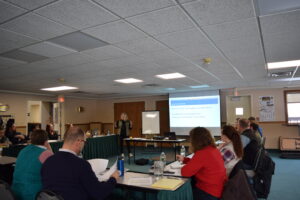
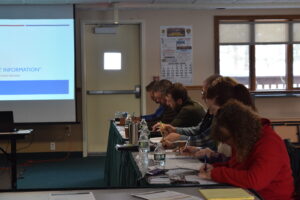
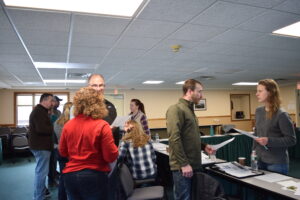
Course materials are available at: http://soilhealth.cals.cornell.edu/workshops/american-farmland-trust/
Additional Cornell training series
As further explained in the "Additional Outcomes" section below, a second round of training was held due to the extension of the SARE grant and because Cornell University received funding to do additional training. This second round included 23 Ag Service Providers. 3 of them are also farmers. 1 additional farmer participated making the total 24 additional trainees in 2020 and 2021. The second round of workshops were modified from the original curriculum due to feedback from the original beneficiaries and COVID-19 restrictions. Therefore the original Workshop 5 was condensed and combined with Workshops 3 and 4 and held on April 8 and 9, 2021. The reported numbers are reflective of including attendees of all workshops for the second round.
Forty (40) farmers and 100 additional farm advisors will attend the 4 field days associated with workshops. They will gain valuable information and provide real world situations for our students to observe, interact with, and gain experience.
The 20 beneficiaries (and the additional service provider and farmer participants) will complete post- workshop and field day surveys/evaluations.
40
100
57
65
January 31, 2020
Completed
January 21, 2020
Of the five workshops held, the first four had field days open to the public. Thirty-seven additional farm advisors attended the field days in addition to the 20 original soil health specialist beneficiaries. It is estimated that fifty-seven farmers have attended the workshops and field days as well.
After all of the trainings were completed, a press release announcing the ‘graduation’ of the Soil Health Specialists was posted to the AFT website on April 29, 2020 (see upload “Learning Through Education Program 1 - SHST Graduate Announcement 042920) and was picked up by other outlets, including Morning Ag Clips. (Learning Through Education Program 2 – Press Release Morning Ag Clips 052820).
Additional Cornell training series
The workshops were held virtually due to COVID-19 restrictions so no additional audience participated in the Round 2 trainings.
ENGAGEMENT TO SUPPORT ACTION
6. The 20 service provider beneficiaries will develop their own “Teacher Tool Kit” by the end of year 2. The “Tool Kit” will consist of presentations, slides, hand-outs, references, demonstrations, etc. introduced during workshops and field days. Beneficiaries will be encouraged to share what tools and resources they have or discover with each other. The “Tool Kits” will be used by beneficiaries to help prepare for their own soil health educational and technical assistance activities with their clients. Beneficiaries will be strongly encouraged to participate with organizations such as the New York Soil Health Work Group, Western New York Soil Health Alliance or other local/regional organizations promoting soil health to expand their knowledge and resource base. We will provide contact information and meeting dates for these organizations. In addition, we will encourage beneficiaries to consider forming farmer soil health discussion groups, especially in areas without existing organizations.
20
7
17
August 31, 2021
Completed
August 27, 2021
The development of the tool kit was completed on August 27, 2021. The tool kit has a collection of presentations, handouts and references from all five workshops. These have been shared both in print and electronically. In addition, a web page has been developed to make resources available to the participants but is also open to the public -
http://soilhealth.cals.cornell.edu/workshops/american-farmland-trust/.
As the workshops were completed and participant evaluations were assessed, it was determined by project leaders that, in addition to printed/electronic media, the beneficiaries would also benefit from having physical tools in their “Tool Kits” to help conduct their own soil health educational and technical assistance activities with their clients. In the spring of 2020, the process of purchasing such physical tools was begun with materials to build a soil slake test demonstration kit. (See “Engagement to Support Action 1 - Cornell-Soil-Health-Slake-Test”). The slake test demonstrates a soil’s resilience to the breakdown of larger soil aggregates into smaller microaggregates when they are exposed to an extreme wetting event. Furthermore, the project team purchased and shipped penetrometers, an instrument that measures the soil’s resistance to penetration (See “Engagement to Support Action 2 - Surface_Subsurface-Factsheet”). The penetrometer is an easy and effective tool for both demonstrating soil compaction to beneficiary clients, but it can also be used to quantify that compaction to assist with management decision making. A total of 12 penetrometers were sent to beneficiaries who asked to receive one because they expected to be able to use it in their work with farmers. Finally, the project team purchased three key SARE publications for beneficiaries to use as references for technical assistance and planning their events. The references are Building Soils for Better Crops, Managing Cover Crops Profitably and Crop Rotation on Organic Farms. All beneficiaries who completed the program received copies of these publications.
Additional Cornell training series
Cornell had their own funding to support the second round of trainings and due to COVID-19 restrictions and other reasons, a toolkit was not made as a deliverable for round 2.
7. 20 Beneficiaries will utilize activity stipends of up to $300 each on a reimbursement basis to support and/or enhance their local soil health related educational events to include presentations, workshops, field days, tours, demonstrations and on-farm technical assistance. Stipends may be used for, but not necessarily limited to the following: speaker expenses; demonstration materials; transportation for tours; meeting room expenses; portable rest rooms; field analyses/assessments; printing costs for hand-outs/resources, agendas, etc.; signage materials; and digging of soil pits. Beneficiaries will be required to complete a request form prior to their event outlining the activity, expected attendance, what the stipend will be used for with estimated cost. For reimbursement beneficiaries will submit a completion form itemizing expenses incurred with receipts provided, final attendance, a copy of the activity’s agenda, and photographs.
20
86
3
February 28, 2021
Completed
January 12, 2021
In order to be able to provide reimbursements for events, a number of activities had to occur. 1) A committee meeting was held in February 2019 to determine what qualified as an event. 2) a webinar training was held on May 23rd to provide expectations to the beneficiaries on what qualifies as stipend eligible event. During this webinar, we also discussed tips for hosting events. 3) A stipend request form was created in order to pre-approve stipends. See SARE AFT Stipend_Request_Form_052319-FILLABLE. 4) a reimbursement form was created the infrastructure for stipends. See SARE AFT Stipend_Expense_Form_052319_FILLABLE. 5) an outreach and technical assistance tracking tool was created and shared for beneficiaries to track their outreach. See SARE AFT Outreach and TA TrackingMaster. The training and resources are all available online at https://soilhealth.cals.cornell.edu/workshops/american-farmland-trust/
Although several beneficiaries have conducted their own local soil health related education events, in the end there were just three stipend reimbursement requests. Several events had been planned by beneficiaries but then canceled due to COVID-19 restrictions. Two workshops that requested reimbursement were held prior to COVID-19 restrictions so there are pictures of folks attending those events:
Engagement to Support Action 3 - T Kautz Pics
Engagement to Support Action 4 - Darleen K.M Stipen Pics
The third workshop, held in August of 2020, was virtual so a copy of the announcement is attached instead.
Engagement to Support Action 5 – Licover crop field day 082020
The virtual event was recorded and links were made available for future viewing:
https://www.youtube.com/watch?v=EYMR64L1TDU (Debbie Aller - summer cover crops)
https://www.youtube.com/watch?v=CZI0OSUKWEU (Joseph Amsili - cover crop roots)
Stipends were used for things like demonstration plot materials, transportation to and from demo plots and meeting room expenses for field days.
Since only 3 of potentially 20 stipends were reimbursed, we conclude that, with this group of beneficiaries, the stipend was not as important to encouraging outreach events as thought during the development of the project. The stipend may need to be greater, but, in general, when beneficiaries planned their outreach, they had funding from other sources in place.
Additional Cornell training series
Cornell had their own funding to support the second round of trainings and due to COVID-19 restrictions and other reasons, stipends and beneficiary outreach was not made as a deliverable for round 2.
VERIFICATION
8. The 20 service provider beneficiaries will complete a quarterly progress report template to assess what they have learned, experiences gained, and updates their training needs; and to track and report on their educational and technical assistance activities including: type of event or assistance, number of farmers/service providers attending, types of farms, acres farmed, and if the farmer conducts a soil health assessment, develops a soil health plan, and/or implements a soil health practice.
20
17
February 28, 2021
Completed
June 12, 2020
A Tracking Tool was created and a webinar training was conducted and recorded for how to use the template on June 20, 2019. Part of the tracking tool includes a section with 6 questions to be answered by the beneficiaries as part of a progress report. The rest of the tracking tool had tabs for event registration, event sign-in, and tracking for technical assistance and any media outreach that occurred. Requests for reports were due in August 2019 and March 2020. 17 of the 20 potential beneficiaries submitted at least one report. Verification materials are available at:
http://soilhealth.cals.cornell.edu/workshops/american-farmland-trust/
A series of interviews were conducted with 14 of the remaining 17 beneficiaries between June 1st and 12th, 2020. At that point, all project participants were a few months into the COVID-19 restrictions, and heading into the outreach season. The purpose of the calls was to check-in to see how the beneficiaries were holding up under the restrictions, and if they still held employment and expected to maintain employment. Given that everyone we spoke with were planning to remain employed, we furthered the discussion by going through their previously described and shared tracking tool to assess experiences gained and to track and report on their educational and technical assistance activities including: type of event or assistance, number of farmers/service providers attending, types of farms, acres farmed, and if the farmer conducts a soil health assessment, develops a soil health plan, and/or implements a soil health practice. Since those interviews, there was little activity due to both the completion of the training courses and to COVID-19 restrictions. A summary of their tracking is in Performance Target Outcomes
Some highlights from the reports include:
“The trainings have made myself more aware of the benefits of no-till, cover crops, etc., and in return I am more open and comfortable talking to producers about trying more cover crops and no-till practices.”
“I was able to convince a large grower to seed 70 acres of prevented plant ground to crimson clover. The training gave me the confidence to recommend this. I focused on soil health and not strictly on dollars”
Additional Cornell training series
Cornell had their own funding to support the second round of trainings and due to COVID-19 restrictions and other reasons, tracking of beneficiary outreach and technical assistance was not made as a deliverable for round 2.
9. The 20 service provider beneficiaries complete a program exit survey to assess the impacts of the project on their work with farmers regarding soil health.
20
7
24
February 28, 2021
Completed
October 05, 2020
As part of the post-program assessment, we entered into a collaboration with Jenny Berkowitz, a graduate student at Cornell University. The goal of her collaboration was to collect exit interviews that assess the increased confidence and ability to adopt soil health practices as a result of the Soil Health Specialist Program. This collaboration was mutually beneficial, facilitating Jenny’s research in extension techniques related to soil health practice adoption. She conducted 24 interviews with both the participants and facilitators from the 2019 program, reaching all but four of the participants. The analysis of these interviews yielded valuable information about the aspects of the program that best enabled confidence in soil health knowledge and intention to adopt soil health practices, and the tools needed to better address future participants interests and needs.
Interviews covered topics ranging from general impressions of the program to the interviewees own personal and professional adoption of soil health practices. Questions surrounding general impressions of the program were focused on the relevance of information, effectiveness of information delivery, and the participants change in confidence in the subject. Questions about personal and professional adoption of soil health practices assessed changes in the perceived barriers to reduced tillage and cover crops on their own, or their client’s farms, before and after their participation in the program. As a whole, the interviews focused on characterizing the participant’s knowledge, skills, intentions and attitudes towards soil health.
The interviews were all transcribed and were coded qualitatively using Atlas-Ti A summary of the report is below:
Program Summary
A total of 17 participants and 7 facilitators were interviewed for the post-Soil Health Specialist Program evaluation. The primary employment areas included government extension, company consultants/retailers, academia, farmers/farm managers, farmer associations, and nonprofits. Participants and facilitators worked in a wide spectrum of production models from organic small scale mixed vegetable production to large grain operations employing the use of chemical inputs.
Participants and facilitators characterized the program teaching methodology in three distinct ways. First, the program was perceived as practical and hands on; facilitators used field experiences, demonstrations, and farm visits to teach participants. Second, the program was seen as collaborative and peer-oriented, exemplified in the use of group discussions and exercises. Finally, participants characterized the program as sequential; the material on soil health continually built on itself over a series of meetings.
All participants had a positive perception of the program. They admired the program for being social, holistic, comprehensive, straightforward, accessible, and interactive. The perception of the program differed depending on the background of each participant, experienced participants tended to focus on expanding their social network, whereas less experienced participants emphasized being able to speak confidently about specific concepts or practices.
Program Outcomes
Following the program there were clear outcomes for participants:
Increased participant confidence. All 17 participants interviewed noted increased confidence through participating in the program. Ten of these participants directly mentioned the result of this confidence boost saying they could now talk more in depth about the technical aspects of soil health. When asked to describe the nature of their increased confidence, one participant said:
“I was always like, ‘Please don’t ask me why.’ And now I’m like, ‘Ask me,’ because I wanna tell you” (Participant 4).
Participants consistently agreed that peer networks, diversity of backgrounds and immersive learning drove the boost in confidence. Moreover, for many participants with well-established backgrounds in soil health practices, the true value for them was acquiring the ability to communicate more confidently about these practices. In sum, the complex interaction of diversity, interactive teaching, and peer engagement drives the increase in participant confidence.
Expanded and enriching professional network. Six participants cited the professional network development as their top tool gained from the Soil Health Specialist Program and the rest cited professional network development and relationship building as an important method for learning and building confidence during the program. Participants and facilitators alike said they only knew between 0-4 people before starting the program, averaging 2.3, implying that this group did facilitate interactions with new people. Participants found the diversity of these new connections particularly enriching and broadened their professional networks.
“I thought the program was a good mix of people, and it was all over the state, there were totally organic people, there were totally conventional people, Long Island, western New York, so I guess I liked – I liked the interaction with the other people as much as some of the trainings” (Participant 3).
Unclear link between participant intention and client adoption. This analysis did not assess the direct adoption of soil health practices as a result of participant advocacy. Given most participants were educators, not farmers, our analysis focused on adoption of new education techniques and communication efforts surrounding soil health. Most participants were already supportive of soil health before the program. Participants often discussed how the program changed the way they think in terms of exposing them to new ideas/perspectives, getting them excited about soil health, and making them more comfortable with practices. The program appears to promote and solidify positive attitudes about soil health and many participants expressed intentions to discuss soil health more often with their clients utilizing educational techniques promoted by the program, especially tactics for learning about their clients and practices used during field experiences.
“Working with customers, you might give them one direction, and now, I might give them different directions and not be so “well, this is what you need to do because of this.” Give them more options and let them choose. Because that, ultimately, is their farm” (Participant 7).
Issues and Challenges
Overall, participants and facilitators had a positive perception of the program. However, they did mention several ways that the program could improve.
Logistics. The most common issue was time management and logistics. Participants often found it challenging to make the time commitment necessary for the program and travel was not always easy for participants. At the same time many participants enjoyed traveling across the state and found the exposure to different geographic agricultural settings to be a great asset of the program. Continued program support for those traveling farther distance will help overcome this challenge and open opportunities for broadened networking and understanding of different farming systems.
“They allowed me to have one more night overnight if it was really far. So, I’d say they were fair at accommodating. The field work was –fun” (Participant 1).
Economic consideration. Several participants reported contradictory program biases. Some participants mentioned that the program favored organic production: “they did have a little bit of a slant towards organic” (participant 16), whereas others reported that the program tended to focus on larger production: “program heavily pursued to the row cropping industry” (participant 13). Additionally, two participants directly mentioned that the program tended to favor Cornell research, programming, and people. However, the only gap consistently mentioned by interviewed participants in the programming was for economic factors. Participants felt the need for more consideration for costs and the economics of adopting soil health practices. Essentially, they would like to know how to guide their clients to profitably adopt soil health practices:
“This was kind of my challenge with the program. I saw a lot of things they were talking about as being idealistic, probably best for soil health, but also, very difficult to implement at any type of scale or see an economic – mark an economic return on. What’s the economic return on planting radishes in July? I don’t know. This class didn’t answer that question” (Participant 10).
Teaching participants how to apply program content to their context. Generally, participants felt that demonstrations were not practical enough and that they need more instructions on how to apply this information to their own individual context. Individual attitudes largely dictated the degree of guidance participants requested, with some participants demonstrating clear ability to apply the concepts to their clients’ farming systems, yet many participants consistently requested explanation of tactics for applying practices in different settings.
Field experience. The majority of participants and facilitators greatly enjoyed the field experiences in particular digging the soil pit, the soil cart demonstration, and farm visits in the Hudson Valley. However, participants consistently did not enjoy the program event hosted at Empire Farm Days because they felt it was chaotic, not geared toward them, and confusing.
Program Conclusion
Participants and facilitators enjoyed and learned from the Soil Health Specialist Program. In particular, the program was valuable to participants because it had a diversity of people, programming, and places. The program helped build strong social connections, boost confidence, and solidify an interest in soil health. There were several challenges or issues associated with the program that can be addressed in future sessions including greater consideration for economic factors, more information on how to adapt these practices to specific contexts and improving certain field experiences.
By the Numbers
100% of participants interviewed mentioned improved confidence when discussing soil health.
21.7 people was the average number of new participants met through the program, with even more new connections made with facilitators and speakers.
86% of participants and facilitators interviewed only mentioned positive impressions related to field experiences.
65% of participants interviewed cited professional connections as an important method at the workshops for learning the topics, gaining confidence in talking about soil conservation at work, and improving soil conservation adoption.
17% of participants interviewed expressly mentioned that they were planning to adopt more soil health practices.
Additional Cornell training series
Cornell had their own funding to support the second round of trainings and did not include a survey as a deliverable for round 2.
Milestone Activities and Participation Summary
Educational activities and events conducted by the project team:
https://soilhealth.cals.cornell.edu/workshops/american-farmland-trust/
https://farmland.org/project/new-york-soil-health-specialists/
Participants in the project’s educational activities:
Learning Outcomes
As part of the post-program assessment, we entered into a collaboration with Jenny Berkowitz, a graduate student at Cornell University. The goal of her collaboration was to collect exit interviews that assess the increased confidence and ability to adopt soil health practices as a result of the Soil Health Specialist Program. She conducted 24 interviews with both the participants and facilitators from the 2019 program, reaching all but four of the participants.
Interviews covered topics ranging from general impressions of the program to the interviewees own personal and professional adoption of soil health practices. Questions surrounding general impressions of the program were focused on the relevance of information, effectiveness of information delivery, and the participants change in confidence in the subject. Questions about personal and professional adoption of soil health practices assessed changes in the perceived barriers to reduced tillage and cover crops on their own, or their client’s farms, before and after their participation in the program. As a whole, the interviews focused on characterizing the participant’s knowledge, skills, intentions and attitudes towards soil health.
The interviews were all transcribed and were coded qualitatively using Atlas-Ti 100% of participants interviewed mentioned improved confidence when discussing soil health. 86% of participants and facilitators interviewed only mentioned positive impressions related to field experiences. 65% of participants interviewed cited professional connections as an important method at the workshops for learning the topics, gaining confidence in talking about soil conservation at work, and improving soil conservation adoption. 17% of participants interviewed expressly mentioned that they were planning to adopt more soil health practices. The analysis of these interviews yielded valuable information about the aspects of the program that best enabled confidence in soil health knowledge and intention to adopt soil health practices, and the tools needed to better address future participants interests and needs.
Performance Target Outcomes
Performance Target Outcomes - Service Providers
Target #1
20
Twenty (20) agricultural service providers trained in advanced soil health principles and practical methods for using crop rotations, cover crops, reduced tillage, nutrient management and other practices on diverse farms across New York will teach 400 farmers operating 80,000 acres about soil health techniques and how to successfully integrate them into their production systems.
400
80,000 acres
15
558
15 Ag Service Providers provided direct education and technical assistance to 558 farmers covering 156,603 acres.
- 196 Consultations
- 9 On-farm demonstrations
- 6 Published press articles/newsletters
- 16 Webinars/talks/presentations
- 17 Workshops/field days
- 5 o Long Island Soil Health Champion video - www.youtube.com/watch?v=9FDnCCSiBHI
o Harris Seeds Earth Day Campaign - Harris Seeds donated revenue made from the earth day weekend to AFT. We also promoted the AFT Soil Health Trainers program so more farmers are aware of the services that AFT provides and helps push research on.
o Empire Farm Days Soil Health Center 2020 Virtual Soil Health Cover Crop Tour Parts 1 and 2 - youtu.be/fAiz1B9Y0i8; https://youtu.be/I7J5aiHsUXc
o Western New York Soil Health Alliance Annual Meeting Demonstration Plots -
youtu.be/dc2hWBOq_Kw
o Western New York Crop Management Association Annual Meeting Demonstration Plots- https://youtu.be/dc2hWBOq_Kw
A Tracking Tool Template was created and shared via email with all original 20 beneficiaries. A webinar training was conducted for how to use the template on June 20, 2019. Part of the tracking tool includes a section with 6 questions to be answered by the beneficiaries as part of a progress report. The tracking tool also includes tabs for beneficiary-hosted event registration, event sign-in, and tracking for technical assistance and any media outreach that occurred.
Requests for reports were due in August 2019 and March 2020 and 15 of the 20 original beneficiaries submitted reports. In addition, a series of interviews were conducted with 14 of the remaining 17 beneficiaries between June 1st and 12th, 2020. In those interviews, project leaders went through each individual’s tracking tool to directly ask questions about experiences gained and to get up to date with tracking and reporting their educational and technical assistance activities including: type of event or assistance, number of farmers/service providers attending, types of farms, acres farmed, and if the farmer conducts a soil health assessment, develops a soil health plan, and/or implements a soil health practice. The oral answers were transferred to the individual’s tracking tool by project leaders after the interview.
Verification materials are available at http://soilhealth.cals.cornell.edu/workshops/american-farmland-trust/
In the end, 15 Ag Service Providers held 17 events, directly reaching 362 farmers (managing 88,973 acres) and 1,363 other stakeholders. Furthermore, the beneficiaries conducted technical assistance with 196 farmers influencing 68,530 acres. There were three main challenges to tracking and achieving our targeted outcomes:
Tracking Data: Despite creating a tracking tool and providing/recording training for the use of the tool, and despite numerous reminders via emails, phone calls and at each training, it was challenging to get beneficiaries to track and report their outreach and technical assistance to the detail that is required for reporting. It is believed that farmers especially do not want to share detailed information about their operation, not trusting that the information will remain secure or knowing what the end result will be. In the cases where detail data was missing such as the number of farms or the number of acres per farm, assumptions were made using existing data. One assumption was that for each field day, workshop, webinar, 25% of participants were farmers. This assumption was based off of attendees from events that were well documented. The second assumption was the number of acres per farm. This depended on the US Census data for the average farm size in the region where the event was held.
COVID-19: The number of outreach and technical assistance events from beneficiaries was significantly challenged by the COVID-19 restrictions. These restrictions occurred in the final full year of the project, when beneficiaries were slated to do their outreach and technical assistance. A number of events were planned for but eventually canceled because they could not be held. In cases where we could, project leaders provided support for virtual meetings. For example, Lorie Ames planned for an in person field day but ended up switching to a virtual presentation that was pre-recorded and shared with 75 people at the Western New York Soil Health Alliance annual meeting: https://youtu.be/dc2hWBOq_Kw
Beneficiary Attrition: One final piece that was unexpected was that beneficiaries would drop out of the program. In total 3 people left the program due to career changes, which is 15% of the total participants. Each outgoing beneficiary expressed interest in continuing but their new employer didn’t support the time away or their position was no longer in the field. This impacted the potential to reach our performance targets due to the smaller pool of beneficiaries to conduct education events and advise farmers.
Performance Target Outcomes - Farmers
Target #1
50
Fifty (50) farmers informed by our beneficiaries will conduct a soil health assessment, develop a soil health plan, or implement a soil health practice such as cover cropping, reducing tillage, crop rotation, and/or nutrient management trial or demonstration.
None specified
101
19,709
At the close of the project at total of 101 farmers, with the consultation of our beneficiaries, either conducted a soil health assessment, developed a soil health plan, and/or implemented a soil health practice such as cover cropping, reducing tillage, crop rotation, addition of organic amendments or nutrient management on a total of 19,709 acres. These acres are included within previously reported numbers in other areas of this report. There were 56 Soil Health Assessments conducted, 47 soil health plans developed and 89 practices implemented.
In order to verify the outcome data, a tracking tool template was created, (SARE AFT Outreach and TA TrackingMaster) and a webinar training was conducted for how to use the template on June 20, 2019. Part of the tracking tool includes a section for Technical Assistance provided to farmers by the beneficiaries. The section asks questions like Farm Name, Type, Acres Managed, whether a Soil Health Assessment was conducted and/or if a Soil Health Plan was created. It also provides a space for describing the type of soil health practice that was implemented (if any). Requests for reports were due in August 2019 and March 2020. 17 of the 20 potential beneficiaries submitted reports.
Verification materials and a training on how to use there were made available at http://soilhealth.cals.cornell.edu/workshops/american-farmland-trust/
In addition, a series of interviews were conducted with 14 of the remaining 17 beneficiaries between June 1st and 12th, 2020. At that point, all project participants were a few months into the COVID-19 restrictions and heading into the outreach season. The purpose of the calls was to check-in to see how the beneficiaries were holding up under the restrictions, and if they still held employment and expected to maintain employment. Given that everyone we spoke with were planning to remain employed, we furthered the discussion by going through their previously described and shared tracking tool to assess experiences gained and to track and report on their educational and technical assistance activities. Since those interviews, there was little activity due to both the completion of the training courses and to COVID-19 restrictions.
Additional Project Outcomes
There were at least 8 new working collaborations. American Farmland Trust (AFT) worked very closely with the Cornell Comprehensive Assessment of Soil Health Program for the first time. In addition, AFT worked with local Soil and Water Conservation Districts as each workshop was planned and implemented. Furthermore, AFT worked closely with the New York Soil Health Initiative for presentations and guidance on curriculum development. We worked closely with the Cortland Soil and Water Conservation District (SWCD) and the Tompkins County SWCD for Workshops 1 and 2 and Cayuga County SWCD for workshop 5. For workshop 4 we partnered closely with Cornell Cooperative Extension to coordinate training locations and accommodations, as well as leading and facilitating group discussions. We also partnered with Stone House Grains and the Hudson Valley Farm Hub for the first time to coordinate trainings and tours that were held on their farms. Finally, we partnered with Jenny Berkowitz, a graduate student at Cornell University. The goal of her collaboration was to collect exit interviews that assess the increased confidence and ability to adopt soil health practices as a result of the Soil Health Specialist Program. This collaboration was mutually beneficial, facilitating Jenny’s research in extension techniques related to soil health practice adoption.
An additional outcome was the professional development that occurred outside of the learning. Beneficiaries have been required write their own biographies, in many cases for the first time. They were given the opportunity for getting a “head shot” taken for professional use, either with their biography or other future engagements. There was also engagement between beneficiaries, facilitating networking and synergy for soil health efforts in the future. We added evening activities during each workshop which gave the participants additional opportunities to interact, get to know each other better, build a sense of community, and strengthen bonds. We believe this will help to coordinate resources and efforts in the future as folks are anticipated to get more comfortable reaching out to one another on a professional level.
Another outcome was the creation and execution of 3 training webinars to supplement the workshops:
- Webinar 1 – Expectations of hosting soil health workshops and providing technical assistance (20 in attendance)
- Webinar 2 – Cover crop mixtures with Dr. Charles White of Penn State Univ.; Review of Soil Health Workshop Stipend Requests (20 in attendance)
- Webinar 3 – Cornell Soil Health Program Research Update and Check-in (20 in attendance)
Even before COVID restricts prevented us from having in-person meetings, we had found that using the webinar application “Zoom” was very useful and effective at conducting additional learning opportunities. Not only is it easy for the beneficiaries to engage, but it is also very easy to record each session and post it online for later reference. The implementation of the webinars stemmed from the need to keep beneficiaries connected between workshops and to provide training that is more focused on administration, not necessarily, soil health. Administrative topics are important, but distract from soil health information so they are good to provide in one-hour intervals rather than using valuable training and networking time when we are all together in person. See attached agendas for the workshops. All content generated from the workshops such as agendas, presentation slides, documents and videos are available online at:
https://soilhealth.cals.cornell.edu/workshops/american-farmland-trust/
An exciting outcome in 2020 and 2021 was that the Soil Health Specialist Training program received additional support from the New York Soil Health Initiative. This support provided for the continuation of the collaboration between American Farmland Trust and Cornell University to expand upon the growing network of agricultural service professionals to support and educate farmers to improve soil health on their land.
In June 2020 a recruitment announcement for program applications was sent out to agricultural service providers through the List-servs of organizations such as New York Agri-Business Association, NE Region CCA, Cornell Cooperative Extension, NY Soil & Water Conservation Districts, AEM Planners, NOFA-NY and others. The flyer included a link to where individuals could apply to the professional opportunity. The announcement and application instructions were posted on the New York Soil Health Website. Additionally, an announcement was made on AFT's social media.
Both the flyer and the website recruitment materials clearly stated performance targets and expectations for our beneficiaries. Approximately 30 service providers from Agri-business, farmers, cooperative extension, soil and water conservation districts, and non-profits completed the application process. There were applications from both the private sector and from the public with an impressive geographic distribution among the applicants. The application included a pre-training skills assessment and questions to identify interested farmers they currently advise who they can further assist on soil health issues if selected for training program. Participants committed to assisting with a soil health workshop or documenting technical assistance surrounding soil health practices. Ultimately, 27 applicants were chosen to participate in the program.
The new Specialist trainees got an in-depth understanding of what soil health is, how it can be measured and monitored over time, and how soil health can be improved through holistic, adaptive, and data-driven soil management. Using lessons learned from the current program project leaders made the second round of training shorter. COVID-19 restrictions also made this program virtual. Our first meeting was held on October 22 and 23, 2020 and followed a modified curriculum to workshops 1 and 2 of the original cohort. (See Additional Outcomes Narrative Workshop 1 Final Agenda 102220). Topics included Soil Health Principles, Soil Health Assessment, Soil Biology and Ecology, Cropping Systems and Cover Crop Benefits, Species Selection and Mixtures. The second and final training was held April 8 and 9, 2021. Topics followed a modified curriculum of workshops 3-5 and included Reduced Tillage, Nutrient Management, and Communicating Soil Health Principles. (See SH Specialist Workshop 2 Agenda 4-8-2021 FINAL). Project leaders are currently planning a third workshop/field day for October, 2021 (See agenda:2021-10-22 Cover Crop Field Day draft), but this workshop may turn virtual due to COVID-19 restrictions. The continuation and expansion of the program to 27 additional beneficiaries significantly increased the impact of this project, although final outcomes will be measured outside the timeframe of this grant.
Another outcome was the additional training of Soil Health Specialists Lorie Ames and Jodi Putman on taking the Cornell Comprehensive Assessment of Soil Health (CASH) tests in the field on May 13, 2020. The CASH test results can be used to inform farmers on targeted management to improve soil health. It can also be used as an outreach tool to show farmers and ag service providers that it is important to look beyond simply testing nutrient levels in their soils by considering physical and biological properties as well.
With the extension of the project, we were able to hire a professional photographer to produce high-quality photographs, highlighting 3 of the Soil Health Specialists beneficiaries (Lynn Bliven, Darleen Krisher-Meehan, Lorie Ames) to promote the project through case studies, social media posts and newsletters. The photos are of the Soil Health Specialist Trainees out in the field working or on their own farms. These photos will be included in 3 case studies that were written and will be released in September, October and November of 2021. The photos will also be available for SARE to use in their future promotional materials. A few sample photos of Soil Health Specialist can be seen here:
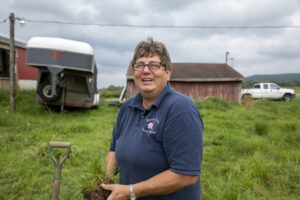
August 10th 2021
@Rebecca Drobis Photography All Rights Reserved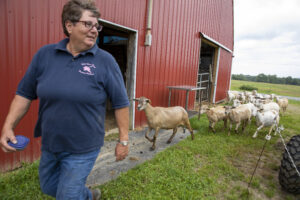
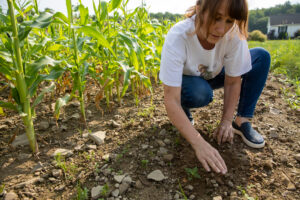
"Through the Soil Health Specialist Training Program, I have gained more in-depth knowledge about soil health and utilizing soil sampling to get maximum yields for my customers and my own farm," she said. "It brought me from just being a seed salesman to the whole picture. With that knowledge, I'm able to sell more, because I'm able to do my job better."
@Rebecca Drobis Photography All Rights Reserved 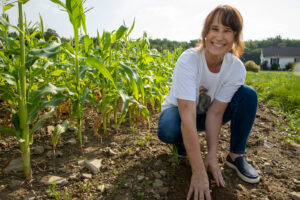
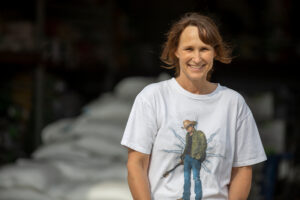
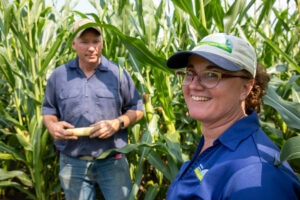
August 11th 2021
@Rebecca Drobis Photography All Rights Reserved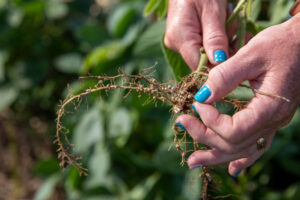
@Rebecca Drobis Photography All Rights Reserved
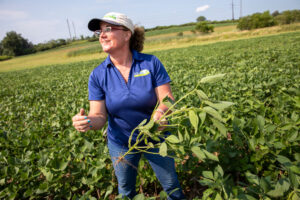
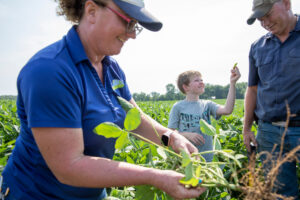
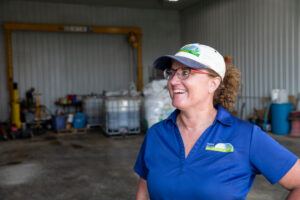
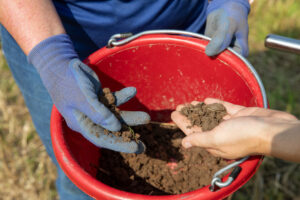
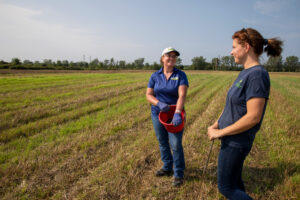
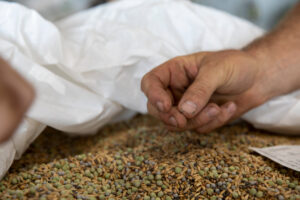
Finally, a Soil Health Specialist webpage was created that describes the program and each workshop and provides a list of beneficiaries by region with contact information:
https://farmland.org/project/new-york-soil-health-specialists/
A post-workshop survey was handed out at the workshop. One beneficiary took the time to send an email with the following praise:
“I was very happy with this session. I took a lot away regarding cover crop species and their specific traits. I feel that the data was presented in a way in which we all understood it. Seeing the different plants, with their root structures really helped me. I feel a lot more confident in advising growers on cover crops. I felt that the lower point / activity ratio was perfect. With the presenters I felt that there was a good balance of academic, ag business and grower input. The field day at King Agra was awesome. Everyone got to see the different cover crops in their various stages of growth. The data presented was easy to digest and everyone was more than helpful.”
A list of resources was shared after the second workshop. One participant had this to share via email:
“Thank you to everyone for putting this together. What a gem! I began to go through the document without previewing it; thinking I would be able to review and provide feedback. The breadth of experience and knowledge of our instructors is evidenced in the scope of this collection! Needless to say, I cannot add anything at this time. I look forward to applying what is contained in it. Personally, I find it astounding. Coming from the background I have, and with what I am learning, I see many opportunities, many challenges, and am more aware of how our historical and current practices interact with the soil.”
One success story that highlights the power of the program is that one of the program beneficiaries, Morgan Hartman, was invited to present at another beneficiary’s (Ann Marie Calabaro) Soil Health Field Day. Morgan raises and sells grass-fed beef and Registered Angus breeding stock and uses a Holistic Planned Grazing approach on his farm to develop healthy soils, plants, animals and people by incorporating a decision-making process that integrates financial, social, and environmental goals. He shared this approach to a group of grazers at the Long Island field day entitled, “Soil Health in Pastures and Pasture Management,” held September 23, 2019 at Acabonac Farms in Middle Island, NY. (Long Island Field Day - pasture management agenda) Ann Marie met Morgan and learned of his expertise through networking during this project’s trainings. Not only was Ann Marie planning her own field day, but she used connections she made during the Soil Health Specialist trainings to enhance her event and bring a specialist to this area of New York that typically gets passed over. Without the trainings and the networking opportunities they provide, this connection would not have occurred, and the Long Island farmers would have missed out.
Another success story is from Soil Health Specialists, Lori Ames. Her story was documented and shared on American Farmland Trust's social media on February 11, 2021:
It was also posted on the AFT website:
Lorie Ames: Building Confidence and Relationships through AFT’s Soil Health Specialist Training Program
With the extension of the project, we were able to hire a professional writer/storyteller to produce 3 additional Soil Health Specialist training profiles highlighting them using the knowledge and skills they received during the training. These stories include the professional photos we received from hiring the professional photographer described above. The stories will be promoted through AFT social media, electronic communications, newsletters, the Soil Health Specialist Trainee webpage and handed out at in-person events (should COVID-restrictions be reduce) The Soil Health Specialist success stories will be released in the coming months but they are written and can be seen here:
Tucker Kautz_ Embracing Soil Health Personally and Professionally - American Farmland (Posted October, 2021)
Lynn Bliven - K.Navarra FINAL 061121 (To be posted November 2021)
Darleen Krisher-Meehan - K.Navarra FINAL 061121 (To be posted December 2021)
With the extension of the project, the Project Coordinator was able to support partner Cornell University and Soil Health Specialist Rod Porter in their presentation of soil health practices for the 2021 in-person Empire Farm Days in Pompey, NY from August 3-5th. NYSH EFD Soil Health Center Agenda 2021. Approximately 35 farmers, extension and other stakeholders attended the 3-day event.
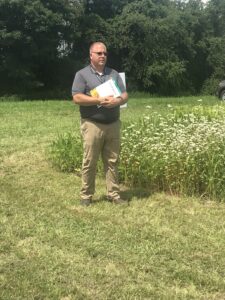
Rod Porter, Soil Health Specialist Trainee leads
a tour of the cover crop demonstration plots
at the 2021 Empire Farm Days
Paul Salon, former NRCS Soil Health Specialist
leads a Demonstration of soil aggregate stability
at the Empire Farm Days.
Finally, two Soil Health Specialist beneficiaries held a joint soil health field day, focused on cover crops, on July 16, 2021 in Andover, NY. It was organized by Lynn Bliven and hosted by Darlene Krisher-Meehan, owner of Country Crossroads Feed & Seed and farmer. This field day aimed to equip attendees with selection, best management practices for cover crops and tips for successfully adding them to their operation. The field day demonstration plot tour was lead by Shane Laurie, Western New York territory field manager, and Scott Rushe, forage market development manager of Seedway. The plots contained several individual cover crops and some mixes. About 10 farmers attended this event. An article was posed in the Olean Times Herald on July 14 - BlivenKirshna Cover Crop Field Day Announcement 071421 as well as Allegany County CCE's webpage - CC Field Day Announcement. See photos:
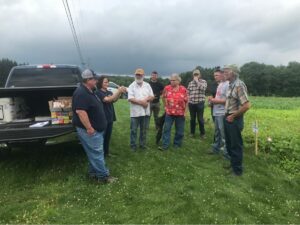
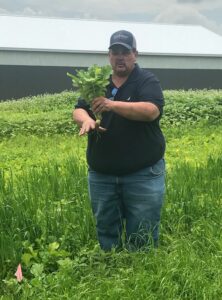
Challenges
The first challenge was a major change of staff from Jeff Ten Eyck to Aaron Ristow. Although Aaron was already part of the project with Cornell, it left only one person for about a month to work on the curriculum development. Cornell replaced Aaron quickly and the project got back up to speed by the completion of the second workshop.
The lack of staff in August and September 2018 posed a challenge, especially with the first two workshops planned and executed within a month of each other. In addition to planning and coordinating the two events, there was a lot of “infrastructure” (e.g training plans, acceptance letters, beneficiary and speaker biographies, etc.) that needed to be developed. This required a lot more time from the Project Coordinator than was budgeted. With the help of the Cornell staff, the project got back on track.
In the grant writing phase, it was thought that planning workshops around existing events would make it easier to coordinate and execute. However, a lesson learned from the first two workshops was that is not necessarily the case. With Workshop One, there ended up being costs for registration that, in retrospect, wasn’t valuable. In Workshop Two, some effort was put in to coordinating with a long-standing field demo in November, but there ended up being personnel and logistical challenges to coordinating with that event so the Team planned our own training and field day.
In 2019 we again saw evidence that planning workshops around existing events doesn’t necessarily make facilitating the coordination of the events simpler. However, due to the large availability of reduced tillage equipment all in one location, Workshop 3 was planned in conjunction with the 2019 Empire Farm Days. Once again, we found that, although it was great to have equipment and demos readily accessible, having presentation available to the public that may or may not have been interested in all of the presentation was distracting. Members of the public came and went as they pleased, often with children, and this was distracting to the beneficiaries. Although workshops 4 and 5 were open to the public, they were not advertised to a wider audience.
We found that coordinating winter meetings were very difficult because there are a lot of long-standing well-attended trainings already being conducted in the Northeast. The beneficiaries in our group have regularly attended these meetings or hosts them themselves and so 5-10 beneficiaries simply are unavailable to attend a February or March meeting. April, May and June are also very full for this group as they begin planning and planting for the season. Mid-summer and early fall meetings were the best attended.
This relates to the lesson that hosting 5 trainings over 18 months is challenging to both the beneficiaries and the project team. It is a challenge for the beneficiaries to get away for a few days every other month for a year, especially during ‘training season’ and the growing season. In addition, we have seen beneficiary careers change over the 18 months to the point where 3 of them have completely dropped out of the program. Organizing that many workshops over a short period of time also spreads the resources of the project team. So many meetings over a year means that the project leads are constantly planning the next meeting, looking for event locations, hotels, caterers, finding presenters, looking for farms to visit, and then providing reimbursements means constant planning and evaluating. Therefore it is recommended that there are fewer trainings over a shorter time period. Perhaps two 3-day trainings, one in the fall and one in the following spring would be sufficient.
Tracking Data: Despite creating a tracking tool and providing/recording training for the use of the tool, and despite numerous reminders via emails, phone calls and at each training, it was challenging to get beneficiaries to track their outreach and technical assistance to the detail that is required for reporting. It is believed that farmers especially do not want to share detailed information about their operation, not trusting that the information will remain secure or knowing what the end result will be. In the cases where detail data was missing such as the number of farms or the number of acres per farm, assumptions were made using existing data. One assumption was that for each field day, workshop, webinar, 25% of participants were farmers. This assumption was based off of lists of attendees from events that were well documented. The second assumption was the number of acres per farm. This depended on the US Census data for the average farm size in the region where the event was held.
COVID-19: The number of outreach and technical assistance events from beneficiaries was significantly challenged by the COVID-19 restrictions. These restrictions occurred in the final full year of the project, when beneficiaries were slated to do their outreach and technical assistance. A number of events were planned for but eventually canceled because they could not be held. In cases where we could, project leaders provided support for virtual meetings. For example, Lorie Ames planned for an in person field day but ended up switching to a virtual presentation that was pre-recorded and shared with 75 people at the Western New York Soil Health Alliance annual meeting: https://youtu.be/dc2hWBOq_Kw. Another example was from beneficiary Rod Porter, who pre-recorded two field-day style presentations. These were shared during the 2020 Empire Farms Days which was held virtually. The two pre-recorded videos were shown to the Zoom audience but then Rod was available live on Zoom to take questions. The videos can be seen here:
Empire Farm Days Soil Health Center 2020: Virtual Soil Health Cover Crop Tour Pt 1
Empire Farm Days Soil Health Center 2020: Virtual Soil Health Cover Crop Tour Pt 2
Beneficiary Attrition: One final piece that was unexpected was that beneficiaries would drop out of the program. In total 3 people left the program due to career changes, which is 15% of the total participants. Each outgoing beneficiary expressed interest in continuing but their new employer didn’t support the time away or their position was no longer in the field. This impacted the potential to reach our performance targets due to the smaller pool of beneficiaries to conduct education events and advise farmers.
Successes
The most frequent feedback that we have gotten through the post-workshop surveys is that the beneficiaries have appreciated and learned the most from the hands-on training such as our participatory “Soil Health Scenarios” small groups and the Cover Crop Demonstration.
In Workshop One we ended the classroom session by breaking the 40 participants into groups of five and giving them different scenarios where a farm has a particular set of soil health constraints reported in the Cornell Soil Health Report. The group discussed the potential management solutions and developed a Soil Health Management Plan (see attached 40-Soil-Health-Management-Scenarios-with-Field-Exercises). Breaking into small groups creates opportunities for more people to speak. Participants can also learn from each other as they discuss and, sometimes, debate practical management solutions. The exercise ended with a spokesperson describing the problems and the solutions their group came up with.
In Workshop 2, we showcased the hands-on Cover Crop Demonstration where 20 varieties of cover crops were planted in plastic tubes and grown in a greenhouse for 5 weeks prior to the workshop. The cover crops were brought to the workshop and pulled out of the tubes so that participants could see the bare root systems of each of the plants. The beneficiaries had the opportunity to pick up and examine all of them in one place. This was followed-up by a discussion of each plant, one-by-one, led by Cornell’s Sustainable Cropping Systems Lab Assistant Professor Mathew Ryan.
Another frequent compliment on our workshops are related to the three field-days we held, all at operating farms. One participant commented that “being out in the field puts everything we are learning into a real-world perspective.” In Workshop One, the farmer gave us a description of his farm and the soil health practices he has implemented, challenges resulting from it, and benefits he has received. We then split the group up where half went to a field pit to learn about identifying soil health indicators in the field and using soil pits as a teaching and demonstration tool. The other half learned about how to take a Cornell Soil Health sample in the field. Workshop Two incorporated a cover crop demonstration of 35 plots of cover crops planted on three dates with different species and mixtures. A discussion of each plot was led by a German group which provided a unique perspective. Workshop 4 visited Stone House Grains and the Hudson Valley Farm Hub.
Beneficiaries have made several comments about the quality of our speaker selection, the topics they are covering, and how it has been organized. This includes our hour-long farmer panel in Workshop Two. One participant said that the farmer panel brought in “real farmers, real issues, real successes”. Another participant said that they appreciated the interaction with the speakers. And finally, one comment was that they “liked how the presenters spoke on something different about the topic but it all tied together.”
As previously described, a final success to date has been the professional development that is occurring outside of the learning. Writing biographies, taking professional headshots, and networking during the workshops are examples of this. To increase networking, we added evening activities which give the participants additional opportunities to interact, get to know each other better, build a sense of community, and strengthen bonds. This will help to coordinate resources and efforts in the future as folks are anticipated to get more comfortable reaching out to one another on a professional level. One participant said “Nice to have participants from all over New York State with different backgrounds, experiences and perspectives!” (see attached surveys 30a WS2 Evaluation_Summaries 102418).
We have seen how networking paid off through professional connections and provided synergy for soil health in the future. As the workshops have finished, we found that adding events like evening activities and webinars in between workshops have given participants additional opportunities to interact, get to know each other better, build a sense of community, and strengthen bonds. This is helping to bring a sense of a network to soil health professionals in New York, and is beginning to pay off as beneficiaries have begun inviting each other to present at each other’s Soil Health events.
This project is demonstrating how it can work and that it has multiple benefits. As the program is developing and more people hear about its impacts, there is a demand for this training to continue. There is currently talk within the New York State Soil Health Working Group about how to fund this program in the future and the program did receive funding to continue, at least in the short term.
In 2020 and 2021, a major success, previous described in the “Additional Outcomes” section, was that the Soil Health Specialist Training program received additional support from the New York Soil Health Initiative. This support provided for the continuation of the collaboration between American Farmland Trust and Cornell University to expand upon the growing network of agricultural service professionals to support and educate farmers to improve soil health on their land. Approximately 30 service providers from Agri-business, farmers, cooperative extension, soil and water conservation districts, and non-profits completed the application process. There were applications from both the private sector and from the public with an impressive geographic distribution among the applicants. The application included a pre-training skills assessment and questions to identify interested farmers they currently advise who they can further assist on soil health issues if selected for training program. Ultimately, 27 applicants were chosen to participate in the program.
